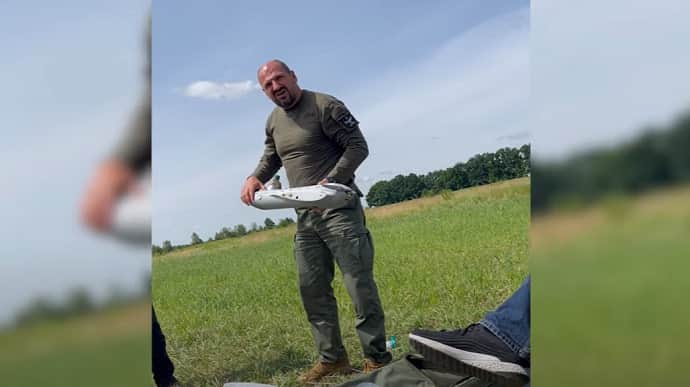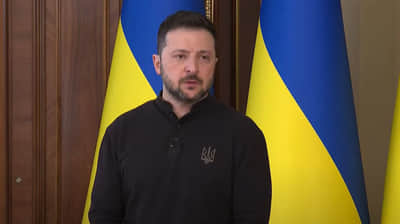Ukraine's Defence Ministry pays US$17.68 million for drones of dubious quality to former lawmaker's firm

The Ukrainian Ministry of Defence (MoD) has paid UAH 650 million [roughly US$17.68 million] in advance to the drone company belonging to the family of former Ukrainian lawmaker Boryslav Rozenblat, which delivered only 1 of 55 contracted UAVs by the deadline.
Source: Bihus.info, a group of anti-corruption and information projects
Details: Bihus.info reported that Ukraine's MoD signed a deal worth UAH 807 million [roughly US$21.95 million] for 55 HAWK uncrewed aerial systems in December 2022 and paid an advance of UAH 650 million [roughly US$17.68 million].
The Ukrainian Aviation System Limited Liability Company (LLC), owned by the wife of former lawmaker Boryslav Rozenblat, a defendant in the high-profile Amber case, was supposed to produce them by mid-August. Rozenblat has repeatedly said this project was his "brainchild" [Under the so-called Amber case, Rozenblat was charged with receiving undue advantage for exercising the right of legislative initiative (Art. 368.4 of the Criminal Code of Ukraine) and abuse of influence (Art. 369-2.2 of the Criminal Code of Ukraine) – ed.].
The company was supposed to deliver all 55 UAV systems to the customer by 15 August but produced only one by that date.
The manufacturer organised training for the pilots a month before the contract was due. The group spoke to the soldiers who attended the training. They said three-quarters of the attempts to fly the UAVs failed, and the drone was launched properly only at the end of the exercises. The journalists posted a video of the drills.
Rozenblat was personally present at these exercises, listening to complaints but assuring the soldiers that everything was fine since they had been given training UAVs. Rozenblat claimed that all the shortcomings would be fixed by the time the drill was completed and the order was handed over.
However, on 14 August, the day before the contract was due to be delivered, it turned out that only four of the 55 ordered UAVs were ready.
The first one took off during the test flight (the "minimum" programme – ed.) but later lost the image. Rozenblat claimed that it had overheated.
During the second flight, the drone took off but failed to land as its wings broke off and a crack appeared on the nose. Rozenblat attributed the broken wings to "model peculiarities", although the documentation did not mention such a "feature".
The commission from the Ukrainian MoD refused to accept the UAVs.
Problems emerged with the second system as well. Rozenblat admits that the fourth UAV did not take off either. Only the third system took off and handled the flight somewhat.
Therefore, mass production was out of the question.
The manufacturer claimed the system was developed in cooperation with foreign partners and primarily consists of imported parts. The HAWK was authorised for use in the Ukrainian Armed Forces back in 2017; former Defence Minister Stepan Poltorak signed the permission back then.
And despite the conclusion that the defining test was successful, there was information that only seven out of nine attempts were successful: twice the same drone presented by the Moldovan partners of UAS LLC Drone-Tech SRL collapsed due to a design defect.
Then, the Ukrainian Defence Ministry signed a contract with the company to which the lawmaker was related.
The first two pieces were made a year later. At the time, their price was about UAH 6 million [roughly US$163,000]. The Defence Ministry ordered seven more systems at the same price in the summer of 2019.
The contract was delayed due to problems with components, their replacement and new tests, and the delivery date was overdue.
Ukraine’s Defence Ministry appealed to the court with a demand to force the manufacturer to pay 10 million hryvnias [US$263,157 – ed.] fines for the contract breach, and the manufacturer appealed with a demand to review the price because, in its opinion, after the components were replaced, the HAWK was much more expensive.
After the beginning of the full-scale invasion, due to the urgent need for UAVs, LLC handed over the systems to Ukraine’s Armed Forces. The systems had been stored unused in the warehouse for several years.
Ukraine’s Defence Ministry reported that they had received no negative feedback from the military.
Ukraine’s Defence Ministry explained why they signed a new contract with the LLC, saying they got such an order from the General Staff. However, the systems’ cost doubled to more than 12 million hryvnias [US$324,605 – ed.].
Rosenblat's former partner, Kostiantyn Pozhydaiev, who was responsible for the contract’s technical side, said that this cost included the amount of losses from the systems, which they previously gave almost for free to Ukraine’s Armed Forces, and 30% of the so-called taxes for the Directorate of Military-Technical Policy, Development of Weapons and Military Equipment of the Defence Ministry.
Rosenblat allegedly offered Pozhydaiev to sign such an additional agreement to the old contract, but Pozhydaiev refused due to the high risks.
At the same time, the contract contains the signatures and seals of Pozhydaiev himself. He claims that they are fake, as he was not in Ukraine at the time of signing.
Pozhydaiev said his partner, Boryslav Rosenblat, had done this to obtain this contract with the Defence Ministry. After that, Rosenblat fired Pozhydaiev from his position as director, and he lost control over the company while Rosenblat lost control over production.
Pozhydaiev watched the video of testing the new Unmanned Aircraft Systems (UAS) HAWK, and he claims that they have nothing in common with those that their company produced before.
The Defence Ministry reported that the new contract with the manufacturer was about the same HAWK as before but with improved characteristics, including increased range, flight time and camera. But, as it turned out, 650 million hryvnias [US$16.3 million – ed.] were paid for untested systems.
Oleksandr Liiev, former departmen head, who signed the contract with UAS LLC, commented that he was sure of buying the same HAWK systems as in the previous batch, and all the relevant services checked the contract's legal, financial and technical components.
Rosenblat stated in August that he could hand over 30 systems in the near future and several dozen more in a couple of months. The Defence Ministry agreed to postpone the deadlines for handing over the systems to October.
However, the contract’s execution is in jeopardy due to the seizure of UAS LLC’s accounts due to the criminal case that Ukraine’s Security Service is investigating. The law enforcement officers assume that the company's management conspired with the Defence Ministry in order to get the funds by concluding a contract at higher prices.
Ukrainska Pravda is the place where you will find the most up-to-date information about everything related to the war in Ukraine. Follow us on Twitter, support us, or become our patron!





